小学英语优秀说课稿[1]
小学英语万能说课稿(优秀3篇)
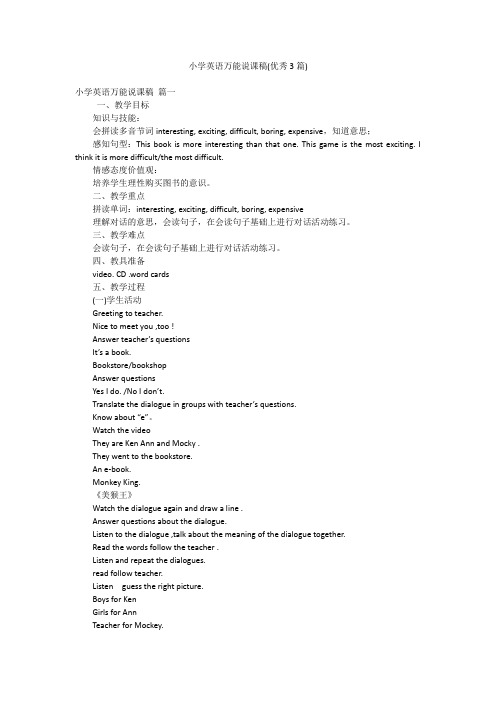
小学英语万能说课稿(优秀3篇)小学英语万能说课稿篇一一、教学目标知识与技能:会拼读多音节词interesting, exciting, difficult, boring, expensive,知道意思;感知句型:This book is more interesting than that one. This game is the most exciting. I think it is more difficult/the most difficult.情感态度价值观:培养学生理性购买图书的意识。
二、教学重点拼读单词:interesting, exciting, difficult, boring, expensive理解对话的意思,会读句子,在会读句子基础上进行对话活动练习。
三、教学难点会读句子,在会读句子基础上进行对话活动练习。
四、教具准备video. CD .word cards五、教学过程(一)学生活动Greeting to teacher.Nice to meet you ,too !Answer teacher’s questionsIt’s a book.Bookstore/bookshopAnswer questionsYes I do. /No I don’t.Translate the dialogue in groups with teacher’s questions.Know about “e”。
Watch the videoThey are Ken Ann and Mocky .They went to the bookstore.An e-book.Monkey King.《美猴王》Watch the dialogue again and draw a line .Answer questions about the dialogue.Listen to the dialogue ,talk about the meaning of the dialogue together.Read the words follow the teacher .Listen and repeat the dialogues.read follow teacher.Listen guess the right picture.Boys for KenGirls for AnnTeacher for Mockey.Act the story in groups.(二)教师活动一:Warming upGreetingNice to meet you!二:Language preparation1 Show a English books askWhat’s this? It’s a ________.We can buy it in _________.Do you like English book/music book/story book/ic book ?2 For the titleToday we will learn “Buying e-book”。
小学英语说课稿范文(优秀9篇)

小学英语说课稿范文(优秀9篇)小学生英语说课稿范文篇一教学目标:1、知识目标(1)掌握词汇:weekend,place, British Museum, how, best, took, river, hour, minute, trip, along.(2)掌握句型:What did you do at the weekend? Where did you go?2、技能目标(1)能读懂、理解课文大意并回答出相关问题;(2)能运用所学句型询问过去所做的事情,去过的地方,并能回答提问。
教学重点:1、正确理解课文。
2、用过去时提问并能描述上周末发生的事情。
教学难点:以what, where引导的一般疑问句过去时。
教学过程:整个教学过程我采用了听、说、玩、演、唱一系列的教学活动,具体设计为热身——新知导入——趣味操练——课文学习—拓展应用五个环节。
Step 1.热身与复习(Warming up and Revision)1、教师与学生集体问候后通过问题"Where is London?What's the capital of England? Did you watch TV yesterday?"分别与个别学生交流。
2、教师播放课件展示英国的旅游景点the British Museum, the London Eye,BigBen及交通工具图画,带领学生边做动作边唱歌曲《London Bridge is falling down》。
(设计意图:教师通过集体相互问候、个别问候的方式、亲切地拉近了师生间的距离,设计的问题与本节课要学的内容相关联,起了铺垫作用。
而生动的歌曲符合学生的身心发展特点和要求,有效地唤起学生学习英语的热情。
这首歌加深了学生对所学知识的印象,在旋律中,他们将回忆起上册学过的关于英国的几个景点,学习本课内容时就不会感到突兀。
)Step 2 Presentation1、教学新词汇(1)教师通过讲故事的方式引出本课的新词汇。
小学英语说课稿优秀6篇
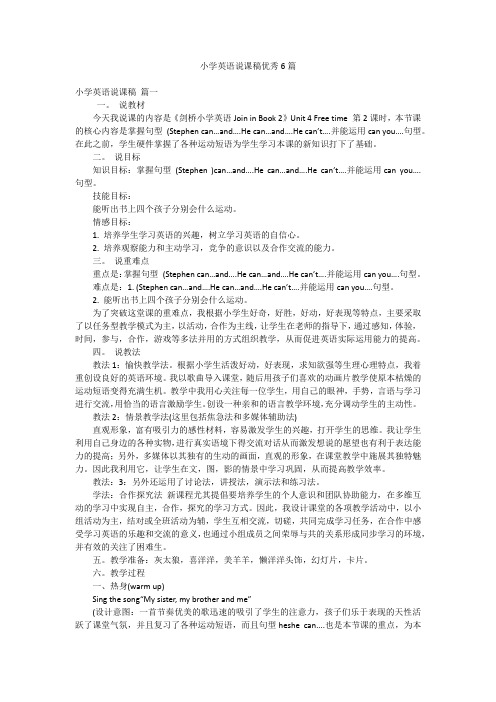
小学英语说课稿优秀6篇小学英语说课稿篇一一。
说教材今天我说课的内容是《剑桥小学英语Join in Book 2》Unit 4 Free time 第2课时,本节课的核心内容是掌握句型(Stephen can…and….He can…and….He can’t….并能运用can you….句型。
在此之前,学生硬件掌握了各种运动短语为学生学习本课的新知识打下了基础。
二。
说目标知识目标:掌握句型(Stephen )can…and….He can…and….He can’t….并能运用can you….句型。
技能目标:能听出书上四个孩子分别会什么运动。
情感目标:1. 培养学生学习英语的兴趣,树立学习英语的自信心。
2. 培养观察能力和主动学习,竞争的意识以及合作交流的能力。
三。
说重难点重点是:掌握句型(Stephen can…and….He can…and….He can’t….并能运用can you….句型。
难点是:1. (Stephen can…and….He can…and….He can’t….并能运用can you….句型。
2. 能听出书上四个孩子分别会什么运动。
为了突破这堂课的重难点,我根据小学生好奇,好胜,好动,好表现等特点,主要采取了以任务型教学模式为主,以活动,合作为主线,让学生在老师的指导下,通过感知,体验,时间,参与,合作,游戏等多法并用的方式组织教学,从而促进英语实际运用能力的提高。
四。
说教法教法1:愉快教学法。
根据小学生活泼好动,好表现,求知欲强等生理心理特点,我着重创设良好的英语环境。
我以歌曲导入课堂,随后用孩子们喜欢的动画片教学使原本枯燥的运动短语变得充满生机。
教学中我用心关注每一位学生,用自己的眼神,手势,言语与学习进行交流,用恰当的语言激励学生。
创设一种亲和的语言教学环境,充分调动学生的主动性。
教法2:情景教学法(这里包括焦急法和多媒体辅助法)直观形象,富有吸引力的感性材料,容易激发学生的兴趣,打开学生的思维。
小学英语说课稿(精选6篇)
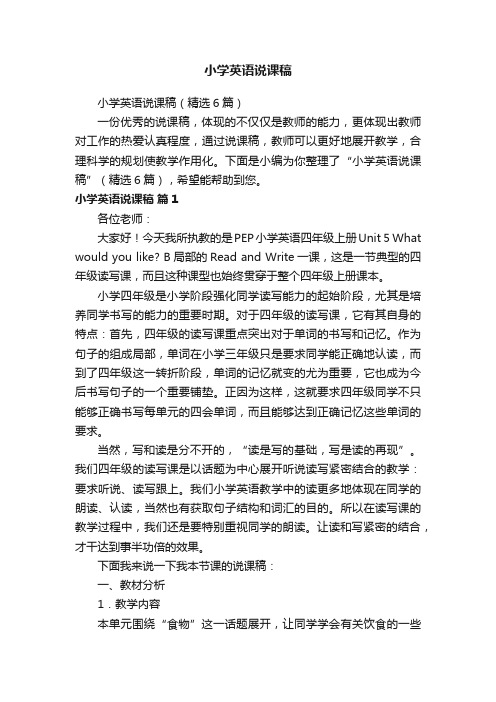
小学英语说课稿小学英语说课稿(精选6篇)一份优秀的说课稿,体现的不仅仅是教师的能力,更体现出教师对工作的热爱认真程度,通过说课稿,教师可以更好地展开教学,合理科学的规划使教学作用化。
下面是小编为你整理了“小学英语说课稿”(精选6篇),希望能帮助到您。
小学英语说课稿篇1各位老师:大家好!今天我所执教的是PEP小学英语四年级上册Unit 5 What would you like? B局部的Read and Write一课,这是一节典型的四年级读写课,而且这种课型也始终贯穿于整个四年级上册课本。
小学四年级是小学阶段强化同学读写能力的起始阶段,尤其是培养同学书写的能力的重要时期。
对于四年级的读写课,它有其自身的特点:首先,四年级的读写课重点突出对于单词的书写和记忆。
作为句子的组成局部,单词在小学三年级只是要求同学能正确地认读,而到了四年级这一转折阶段,单词的记忆就变的尤为重要,它也成为今后书写句子的一个重要铺垫。
正因为这样,这就要求四年级同学不只能够正确书写每单元的四会单词,而且能够达到正确记忆这些单词的要求。
当然,写和读是分不开的,“读是写的基础,写是读的再现”。
我们四年级的读写课是以话题为中心展开听说读写紧密结合的教学:要求听说、读写跟上。
我们小学英语教学中的读更多地体现在同学的朗读、认读,当然也有获取句子结构和词汇的目的。
所以在读写课的教学过程中,我们还是要特别重视同学的朗读。
让读和写紧密的结合,才干达到事半功倍的效果。
下面我来说一下我本节课的说课稿:一、教材分析1.教学内容本单元围绕“食物”这一话题展开,让同学学会有关饮食的一些句子和习惯用语,如What would you like for dinner? I’d like…本课重点让同学掌握四个有关食物的四会单词rice,beef,fish,chicken。
这四个单词同学们在A局部的Let’s learn中已经学过,因此我上课之前以歌曲和菜单的形式让同学复习一下本课的四会单词。
小学英语教案说课稿(优秀6篇)
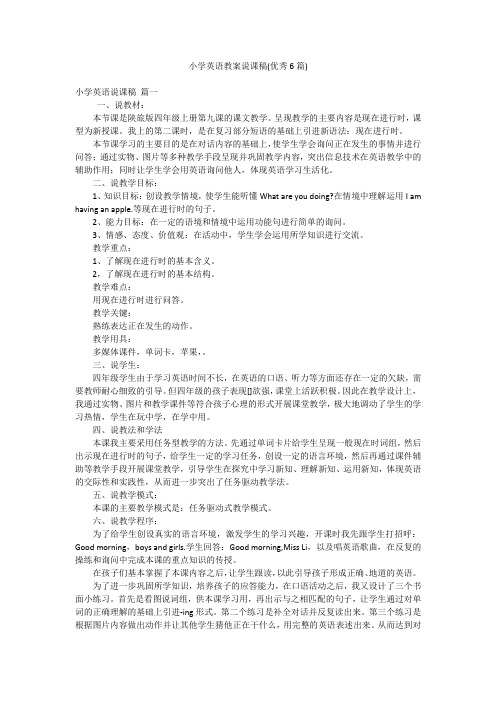
小学英语教案说课稿(优秀6篇)小学英语说课稿篇一一、说教材:本节课是陕旅版四年级上册第九课的课文教学。
呈现教学的主要内容是现在进行时,课型为新授课。
我上的第二课时,是在复习部分短语的基础上引进新语法:现在进行时。
本节课学习的主要目的是在对话内容的基础上,使学生学会询问正在发生的事情并进行问答;通过实物、图片等多种教学手段呈现并巩固教学内容,突出信息技术在英语教学中的辅助作用;同时让学生学会用英语询问他人,体现英语学习生活化。
二、说教学目标:1、知识目标:创设教学情境,使学生能听懂What are you doing?在情境中理解运用I am having an apple.等现在进行时的句子。
2、能力目标:在一定的语境和情境中运用功能句进行简单的询问。
3、情感、态度、价值观:在活动中,学生学会运用所学知识进行交流。
教学重点:1、了解现在进行时的基本含义。
2,了解现在进行时的基本结构。
教学难点:用现在进行时进行问答。
教学关键:熟练表达正在发生的动作。
教学用具:多媒体课件,单词卡,苹果,。
三、说学生:四年级学生由于学习英语时间不长,在英语的口语、听力等方面还存在一定的欠缺,需要教师耐心细致的引导。
但四年级的孩子表现[]欲强,课堂上活跃积极。
因此在教学设计上,我通过实物、图片和教学课件等符合孩子心理的形式开展课堂教学,极大地调动了学生的学习热情,学生在玩中学,在学中用。
四、说教法和学法本课我主要采用任务型教学的方法。
先通过单词卡片给学生呈现一般现在时词组,然后出示现在进行时的句子,给学生一定的学习任务,创设一定的语言环境,然后再通过课件辅助等教学手段开展课堂教学,引导学生在探究中学习新知、理解新知、运用新知,体现英语的交际性和实践性,从而进一步突出了任务驱动教学法。
五、说教学模式:本课的主要教学模式是:任务驱动式教学模式。
六、说教学程序:为了给学生创设真实的语言环境,激发学生的学习兴趣,开课时我先跟学生打招呼:Good morning,boys and girls.学生回答:Good morning,Miss Li,以及唱英语歌曲,在反复的操练和询问中完成本课的重点知识的传授。
小学英语英文版说课稿通用3篇
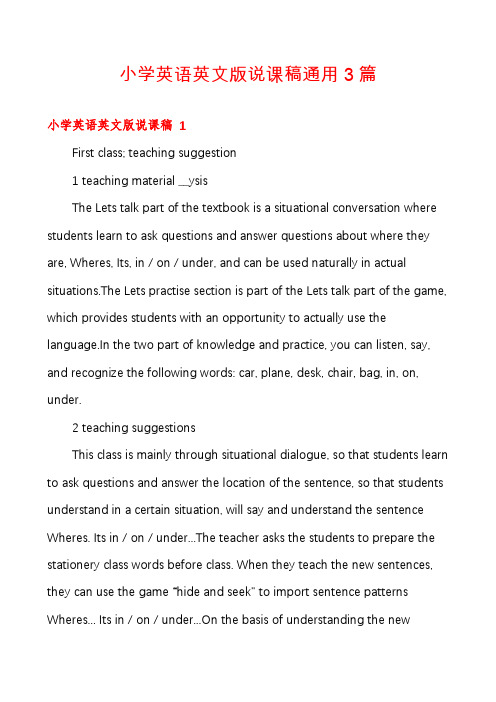
小学英语英文版说课稿通用3篇小学英语英文版说课稿 1First class; teaching suggestion1 teaching material __ysisThe Lets talk part of the textbook is a situational conversation where students learn to ask questions and answer questions about where they are, Wheres, Its, in / on / under, and can be used naturally in actual situations.The Lets practise section is part of the Lets talk part of the game, which provides students with an opportunity to actually use the language.In the two part of knowledge and practice, you can listen, say, and recognize the following words: car, plane, desk, chair, bag, in, on, under.2 teaching suggestionsThis class is mainly through situational dialogue, so that students learn to ask questions and answer the location of the sentence, so that students understand in a certain situation, will say and understand the sentence Wheres. Its in / on / under...The teacher asks the students to prepare the stationery class words before class. When they teach the new sentences, they can use the game “hide and seek" to import sentence patterns Wheres... Its in / on / under...On the basis of understanding the newsentence patterns, use the courseware to learn the new dialogue, so as to recognize the words in the class.Finally, once again, through the game, tin and consolidate the content of the Lets talk, the game can be divided into collective and group game game two, and will find stationery extended to find toys or other things around.Second hours teaching suggestion1 teaching material __ysisThis session is divided into two sections: Lets, learn, and Lets play.The Lets learn section focuses on teaching a few words that represent transport: bus, bike, jeep, taxi, and a preliminary understanding of the phrase "Look out".Lets play is part of the Lets talk part of the first class, to provide students with an opportunity to use language in real life.2 teaching suggestionsThe main lesson to learn several express transport words: bus, bike, jeep, taxi, students of these words have a preliminary understanding, learning again, teachers should design easy to mobilize the students interest and enthusiasm for learning activities.In the introduction of new classes, the introduction of new lessons with simple strokes, but also the use of real toys to allow students to perceive, to attract students with colorful pictures, with familiar voices to mobilize students.Then use animation courseware to present new knowledge.In the training session, the teacher may design the interesting activity, lets the student consolidatein the play, moves.Third hours teaching suggestion1 teaching material __ysisThis session includes two sections: Lets, say and Lets do.The Lets say part is to train students to listen, say, read and write letters Uu, Vv, Ww, and to make the students understand and speak the letters at the beginning of the word "umbrella", "under", "vest", "Violin", "window", "wind".The Lets do section reviews and consolidates the letter "A-W" through rhythmic, rhythmic instructions.And preliminary understanding of the list of action words show, point, type, colour, say, but also for students to provide a basis for language learning.A-T is the teaching content of this book Unit 1 through Unit 4.2 teaching methodsWhen teaching letters and words, the teacher uses letters, words and actions to present letters and words at the same time, so that students can learn on the basis of understanding the meaning of words.Such as: umbrella, vest, window, can be explained in kind; violin, wind explained by action.(according to students or teachers change the situation) understand the meaning of words, help to express words, more skilled reading words, and then learn letters, to master pronunciation, master letters shape.[Topic] Unit, Five, Where, is, my, ruler?[emphasis on teaching] everyday expressions Where s...And its It s in /on / under....[teaching difficulties] sentences: Where, is, my, car, In, the, toy, box, understanding[teaching aid preparation]1 the teacher prepares the tapes for teaching materials.2 teachers prepare Let s talk part of the courseware.3 teachers and students are ready for pen, pencil, ruler, eraser, bag and other stationery and car, toy, box, ball, plane, doll and other toys.4 teachers prepare cards and pictures of the words they learn.5 students prepare white paper and watercolor pen, ready to draw.6 students prepare patches for the group.[teaching process]1 warm up and review (Warm-up/Revision)(1) students practice everyday expressions.(2) games Show, me, the...Teachers or students say words such as "pencil", and teachers and students say Show, me, the, pencils., teachers and students put up pencils.In this way, practice other stationery words in the sameway.Teachers and students play games together to improve game effectiveness and munication between teachers and students.(3) the teacher plays the recordings of book Unit, 2, B, part Let, s, chant, and the students listen and clap and chant rhythmically.小学英语英文版说课稿 2Background of English teaching in primary school: It is not a long history that English is as a subject in primary school in our country and the main instructional aims of teaching English in primary school is to cultivate pupils’ basic abilities of their listening and speaking and their good sense of the English language. Our boys and girls are exposed to English for the first time, so it is very important to develop their keen interest in English.I. Contents:Today I’m going to talk about Part B of Unit 2, PEP Primary English, Book 3. This lesson includes two parts: Let’s talk and let’s practice. In section 1, it mainly deals with the dialogue about “What’s in the schoolbag?” and the answers. And in section 2, it provides a real situation for the Ss to prastise the pattern: How many +n.(pl.)+ do you have? And the answer: I have 23 +n.(pl.)II. Teaching aims1. Aims on the knowledge(1) To enable the Ss to understand and speak: “My schoolbag is heavy. What’s in it? Thank you sooooooo much.” Make sure that Ss can use these sentences in real situations.(2) To help Ss to finish the survey.(3) Let Ss finish the assessment of “Let’s check” in this unit.2. Aims on the abilities(1) To develop Ss’ abilities of listening and speaking.(2) To train the Ss’ ability of working in groups.(3) To foster Ss’ abilities of munication and their innovation.3. Aims on the emotion(1)To foster Ss’ consciousness of good co-operation and proper petition.(2) To lead Ss to show their loveliness to the poor.III. Key-points of this lesson(1) To help Ss ask and answer the question: What’s in it?(2) To enable Ss to study in groups and co-operate skillfully.(3) To develop Ss’ interest in English.IV. Difficult points(1) To help the Ss ask and answer the question “What’s in it?” and make sure they can use the plural nouns correctly.(2) To finish the survey by themselves.V. Teaching methodsAs we all know: the main instructional aims of learning English in primary school is to cultivate pupils’ basic abilities of l istening and speaking and their good sense of the English language. So in this lesson I’ll mainly use “Task-based” teaching method. That is to say, I will let the Ss learn in real situations, finish a task by making a survey to help the Ss to get a better understanding of the key structure of the dialogue. I willarrange four kinds of activities: singing, guessing game, finishing a survey and having a petition. And in this lesson a recorder, CAI, school things and a printed form will be needed. Students should prepare some school things.VI. Teaching procedures and purposes of my designing.I’ll finish this lesson in five steps.Step 1. Warm-up and preview1. Free talk between T and Ss about things in the classroom.2. Sing the song together: Books and pencils.3. Do some TPR, for example: Show me your English book. Show me your crayon.4. Review the numbers by asking: “How many crayons do you have?”Purpose: It is important to form a better English learning surrounding for the Ss by singing and doing some total physical response and at the same time it provides situations to review learned knowledge for the next step.Step 2. PresentationNow I’ll mainly talk about this step.1. Present the pattern: “My schoolbag is heavy.” “What’s in it?.”(1) Show a bag and say: “Look! I have a bag.” Carry it and say: “Oh, it is heavy. My schoolbag is heavy.” Help the Ss understand the meaning with the help of my body language. Then lead the Ss to read the sentence.Make sure they can say it correctly.(2) T: My schoolbag is heavy.Open the bag and say: “What’s in it? What’s in my schoolbag?”Take out a Chinese book. Then do the action again. Let the Ss read the sentence.2. Play a guessing game. Divide the whole class into four groups to have a petition.Let them guess: What’s in the bag? How many? Purpose: To present the key structures one by one is much easier for the Ss to learn and grasp the meanings. Proper petition can arouse the Ss’ interest in Englis h learning.3. With the help of the CAI to present the dialogue. Set a situation to help Ss understand: Two Ss are ing. One girl is carrying a heavy bag on her back. They are talking.Girl: My schoolbag is heavy.Boy: What’s in it?Girl: 20 story-books, 32 pencil, 9 rulers, 12 crayons and 30 picture-books. Etc.Boy: What will you do?Girl: They are for the poor.Boy: Great! I’ll bring some school things too.The boy es back home and puts a lot of things into the bag. Then hegoes to school again and gives them to a teacher. While he is taking them out, he is counting the numbers of all things. The teacher says: Thank you soooooooo much.4. Mention that we should take care of the poor.5. Play the cassette. Let the Ss listen and imitate the dialogue.Pay attention to their pronunciation and intonation. Purpose: CAI can provide a real situation for the Ss to understand the dialogue and the relationships between people better. Tell the Ss we should show our loveliness to the Ss.Step 3. PracticeDivide Ss into groups of six children. Each one would finish the printed form by asking and answering: How many storybooks do you have? Find out which group finishes faster. Story books picture-books sharpeners crayons pencils erasers pencil-cases rulers Chen Jie 8 24 3 32 26 4 1 3 Purpose: Task-based teaching method is used here to develop Ss’ ability of munication and also their ability of co-operation will be well trained.Step 4. AssessmentHelp Ss finish “Let’s check” of this unit and workbook.Purpose: To check the knowledge Ss have learned in this period.Step 5. Add-activity1. Let Ss tell each other how many school things they have after class.Tell their parents how many school things they have at home.2. Take care of everything they have.Purpose: Revision is so important that Ss should speak English as much as they as in class or after class. It is necessary for the Ss to do some extensive exercises after class to consolidate the knowledge they learned. 小学英语英文版说课稿 31. content of teaching materialsThis section focuses on festivals and focuses on how people usually spend their holidays.This class requires students to master the National, Day, Halloween, Christmas, Spring, Festival and What do people usually do at of...I?...And free to talk about how to spend the holidays.In this class, did leads to general questions and answers as well as new ones.Because the past tense of the be verb has appeared in the first third units, it is easier for the students to master it when they are studying.2. status of teaching materialsThe selected course in this class is English 6A Unit 6 in Oxford primary school.The teaching of this unit revolves around festivals.In this section of the festival, students have the knowledge of the previous third units foreshadowing, relatively easy to depth and expansion.This arrangement reflects not only the progressive meaning of teaching materials, but also the students knowledge level and cognitive level.On how people spend their holidays, especially in Western festivals,.Students are required tocollect information in time after class.In the actual teaching, this class uses the old topic, first teaches the new sentence pattern, and uses the sentence pattern to lead the new knowledge way to unfold, this is advantageous for the student to accept and grasp, also has manifested the teaching content the continuity.Say target:1. teaching objectivesThe new curriculum emphasizes the organic bination of knowledge and skills, process and method, emotion, attitude and values, and in the light of this understanding, I set the following teaching objectives: three.[Objective] to students cognitive spoken phrases and words: visit relatives and friends, go to parties, dress up in costumes, ware masks, make pumping lanterns, eat lots of delicious food, National Day, Christmas, Halloween, Spring, Festival, favourite; can use Whens s...What, do, people, usually, do, at...Did you?st...Yes, I, did./, No, I, didn, T. and so on.Ability to municate in English on holidays, and some students can introduce the festival in English fluently.[Objective] through activities and games, students are interested in learning English. Students are encouraged and willing to talk and participate actively in munication.And let students cultivate their sense of cooperation and petition in the process of learning.2. teaching difficultiesThe focus of teaching is to let students master the phrase, can use phrases to municate, the ability of students to use the phrase to describe the preliminary exercise Festival; difficulty is to enable students to understand the temporal changes in richness and realize the use of different phrases to create language.Doctrine of teaching:1. teaching method designAccording to the characteristics of this English class itself and the sixth grade students interest, I through the design of a specific image of the scene, the old with the new, continuous rolling knowledge, in order to disperse the difficulty of teaching, let students perceive and understand.At the same time, the creation of a number of tasks, from words to phrases to sentence to dialogue to pieces, make students practice and meaningful practice in multi exchange between teachers and students in learning, give full play to their enthusiasm, cultivate their ability to learn to use.2. learning method guidanceTo guide students through the method of parison, observation and speculation gradually new language project function, let the students in practice to realize multi-level learning English "use" the necessity, to encourage students to think actively, bold attempt.3. teaching meansAccording to the teaching content, teaching objectives, students age characteristics and psychological characteristics, in order to better stimulate students interest in learning, so as to actively participate in learning.Multimedia courseware, pictures and other teaching aids teaching, the abstract sentence in a vivid scene, the game, not only make the learning process more relaxed, can special case.Say process:1. warm up (Warm up)(1) announce the way of study in this lesson: group petition.The seats are divided into four teams, each of which is based on the class performance of each student. At the end of the class, WINNER is added.Then, begin "one sentence for each class". The sentences taught in this class are "Lite is long if you know how to use it.""[design intention] the announcement of the study style made the students full of interest in the lesson and aroused their fighting spirit and desire for the groups performance."One sentence for each class" is an essential part of every class I started in grade six.This section mainly teaches students some clever words and phrases.These sentences not only enrich students vocabulary, improve their expression ability, but also enable them to learn idiomatic expressions in english.So as to create a good atmosphere for learning english.2. take the old with the new [lead in]Provide topic Birthday, free munication between teachers and students, and then use the "How do you your birthday spend" to draw the new sentence pattern of this lesson "What do you on your birthday do", and then import "Did you"..."Last birthday?" and answer.Then use the Colour topic to elicit the sentence pattern My favourite....[design intention] to get rid of new knowledge through old knowledge is one of my frequently used teaching methods.With new students, students can master the sentence patterns more easily.At the same time, bine the new sentences with the old ones.It helps to cultivate students open thinking ability.。
小学英语说课稿(优秀9篇)
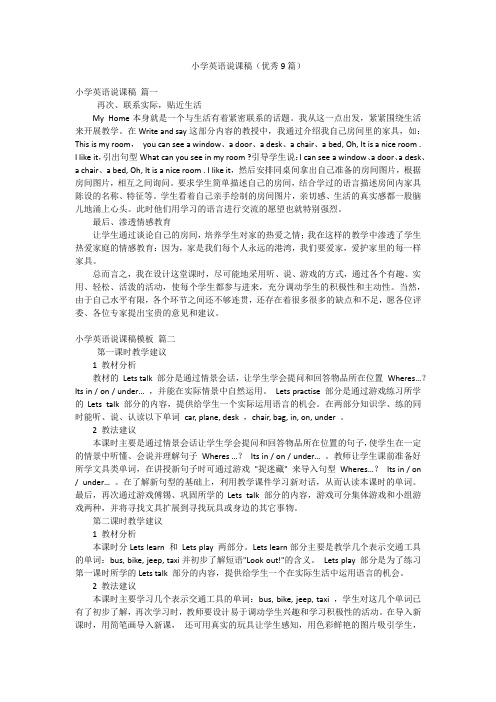
小学英语说课稿(优秀9篇)小学英语说课稿篇一再次、联系实际,贴近生活My Home本身就是一个与生活有着紧密联系的话题。
我从这一点出发,紧紧围绕生活来开展教学。
在Write and say这部分内容的教授中,我通过介绍我自己房间里的家具,如:This is my room,you can see a window、a door、a desk、a chair、a bed, Oh, It is a nice room .I like it,引出句型What can you see in my room ?引导学生说:I can see a window、a door、a desk、a chair、a bed, Oh, It is a nice room . I like it,然后安排同桌间拿出自己准备的房间图片,根据房间图片,相互之间询问。
要求学生简单描述自己的房间,结合学过的语言描述房间内家具陈设的名称、特征等。
学生看着自己亲手绘制的房间图片,亲切感、生活的真实感都一股脑儿地涌上心头。
此时他们用学习的语言进行交流的愿望也就特别强烈。
最后、渗透情感教育让学生通过谈论自己的房间,培养学生对家的热爱之情;我在这样的教学中渗透了学生热爱家庭的情感教育:因为,家是我们每个人永远的港湾,我们要爱家,爱护家里的每一样家具。
总而言之,我在设计这堂课时,尽可能地采用听、说、游戏的方式,通过各个有趣、实用、轻松、活泼的活动,使每个学生都参与进来,充分调动学生的积极性和主动性。
当然,由于自己水平有限,各个环节之间还不够连贯,还存在着很多很多的缺点和不足,愿各位评委、各位专家提出宝贵的意见和建议。
小学英语说课稿模板篇二第一课时教学建议1 教材分析教材的Lets talk 部分是通过情景会话,让学生学会提问和回答物品所在位置Wheres…?Its in / on / under… ,并能在实际情景中自然运用。
Lets practise 部分是通过游戏练习所学的Lets talk 部分的内容,提供给学生一个实际运用语言的机会。
小学英语说课稿(优秀10篇)

小学英语说课稿(优秀10篇)(经典版)编制人:__________________审核人:__________________审批人:__________________编制单位:__________________编制时间:____年____月____日序言下载提示:该文档是本店铺精心编制而成的,希望大家下载后,能够帮助大家解决实际问题。
文档下载后可定制修改,请根据实际需要进行调整和使用,谢谢!并且,本店铺为大家提供各种类型的经典范文,如总结报告、合同协议、规章制度、条据文书、策划方案、心得体会、演讲致辞、教学资料、作文大全、其他范文等等,想了解不同范文格式和写法,敬请关注!Download tips: This document is carefully compiled by this editor. I hope that after you download it, it can help you solve practical problems. The document can be customized and modified after downloading, please adjust and use it according to actual needs, thank you!Moreover, our store provides various types of classic sample essays, such as summary reports, contract agreements, rules and regulations, doctrinal documents, planning plans, insights, speeches, teaching materials, complete essays, and other sample essays. If you want to learn about different sample formats and writing methods, please pay attention!小学英语说课稿(优秀10篇)一份优秀的说课稿,体现的不仅仅是教师的能力,更体现出教师对工作的热爱认真程度,通过说课稿,教师可以更好地展开教学,合理科学的规划使教学作用化。
小学英语的优秀说课稿(通用21篇)

小学英语的优秀说课稿小学英语的优秀说课稿(通用21篇)作为一位无私奉献的人民教师,往往需要进行说课稿编写工作,借助说课稿可以让教学工作更科学化。
我们应该怎么写说课稿呢?以下是小编为大家整理的小学英语的优秀说课稿,希望能够帮助到大家。
小学英语的优秀说课稿篇1一、说教学内容今天我说课的内容是人民教育出版社出版的PEP Primary English Book IV Unit 6 At a Farm.的第一课时,主要学习sheep, lamb, goat, cow, horse, hen六个新词..二、说教材本节课是单词教学。
它是在学生初步学习了句型―How many……do you have?之后进行教学的。
通过学习新词,感知句子What are they? They are….How many….为下节课的教学打下基础。
本课时容量大,但难度不大,并受到学生的喜爱.三、说教学目标《英语课程标准》指出:激发和培养学生学习英语的兴趣,使学生树立自信心,养成良好的学习习惯和形成有效的学习策略,发展学生自主学习的能力和合作精神是小学英语教学的基本任务。
在认真分析教材的基础上,我针对学生实际,将本课时的教学目标及重,难点确定如下:1、知识目标(1)使学生能听、说、认、读sheep, lamb, goat, cow, horse, hen等单词。
(2)初步感知:―What are they? They are…. How many….How many……‖等句子,学生能听懂并理解其意思.。
2、能力目标:(1)能听懂Let‘s do中的指令并做出相应动作.,如Shear a sheep.(2)能区分农场的动物,培养学生灵活运用所学知识进行交流的能力.3、情感目标(1)培养学生注意观察、认真模仿的良好习惯和主动竞争的竟识。
(2)激发学生学习英语的兴趣,使学生树立学习英语的自信心。
(3)培养学生的合作交流能力。
四、说教学重点学习新词sheep, lamb, goat, cow, horse, hen, 能正确认读。
小学英语说课稿(5篇)
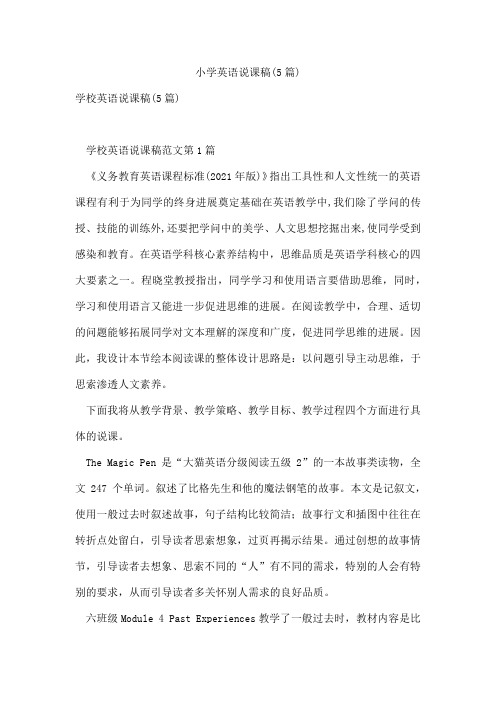
小学英语说课稿(5篇)学校英语说课稿(5篇)学校英语说课稿范文第1篇《义务教育英语课程标准(2021年版)》指出工具性和人文性统一的英语课程有利于为同学的终身进展奠定基础在英语教学中,我们除了学问的传授、技能的训练外,还要把学问中的美学、人文思想挖掘出来,使同学受到感染和教育。
在英语学科核心素养结构中,思维品质是英语学科核心的四大要素之一。
程晓堂教授指出,同学学习和使用语言要借助思维,同时,学习和使用语言又能进一步促进思维的进展。
在阅读教学中,合理、适切的问题能够拓展同学对文本理解的深度和广度,促进同学思维的进展。
因此,我设计本节绘本阅读课的整体设计思路是:以问题引导主动思维,于思索渗透人文素养。
下面我将从教学背景、教学策略、教学目标、教学过程四个方面进行具体的说课。
The Magic Pen是“大猫英语分级阅读五级2”的一本故事类读物,全文247个单词。
叙述了比格先生和他的魔法钢笔的故事。
本文是记叙文,使用一般过去时叙述故事,句子结构比较简洁;故事行文和插图中往往在转折点处留白,引导读者思索想象,过页再揭示结果。
通过创想的故事情节,引导读者去想象、思索不同的“人”有不同的需求,特别的人会有特别的要求,从而引导读者多关怀别人需求的良好品质。
六班级Module 4 Past Experiences教学了一般过去时,教材内容是比较简洁地谈论自己过去做的事,而讲故事是一般过去时最重要的运用情景,借助这个绘本故事阅读的拓展,能更综合地呈现这个时态的运用,让同学更深化地体验这个时态。
六班级同学,抽象规律思维正处于全面进展阶段,能够进行初步的辩证思维。
这阶段的同学尚未把握科学的阅读方法,需要老师和家长供应适当的阅读方法指导和环境条件,促进他们阅读策略和力量的进展,养成良好的阅读习惯。
同学在三班级语文课本中已经学习了《神笔马良》的故事,这与本课时的绘本故事异曲同工,所以马良的故事可以成为同学已有的背景学问,其情节的进展与猜测方法可以“正迁移”到本课的故事学习中。
最新小学英语全英说课稿(精选10篇)
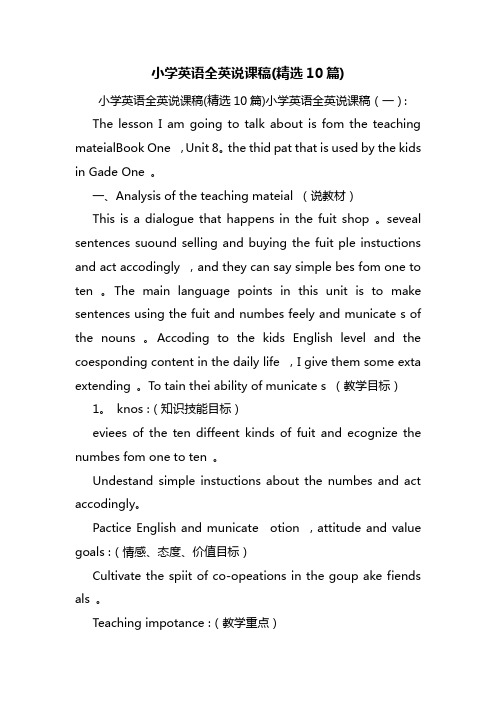
小学英语全英说课稿(精选10篇)小学英语全英说课稿(精选10篇)小学英语全英说课稿(一):The lesson I am going to talk about is fom the teaching mateialBook One ,Unit 8。
the thid pat that is used by the kids in Gade One 。
一、Analysis of the teaching mateial (说教材)This is a dialogue that happens in the fuit shop 。
seveal sentences suound selling and buying the fuit ple instuctions and act accodingly ,and they can say simple bes fom one to ten 。
The main language points in this unit is to make sentences using the fuit and numbes feely and municate s of the nouns 。
Accoding to the kids English level and the coesponding content in the daily life ,I give them some exta extending 。
To tain thei ability of municate s (教学目标)1。
knos :(知识技能目标)eviees of the ten diffeent kinds of fuit and ecognize the numbes fom one to ten 。
Undestand simple instuctions about the numbes and act accodingly。
小学英语说课稿(通用19篇)
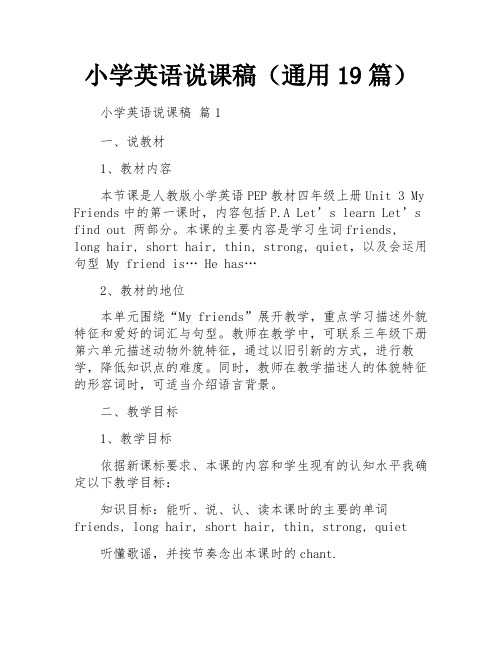
小学英语说课稿(通用19篇)小学英语说课稿篇1一、说教材1、教材内容本节课是人教版小学英语PEP教材四年级上册Unit 3 My Friends中的第一课时,内容包括P.A Let’s learn Let’s find out 两部分。
本课的主要内容是学习生词friends, long hair, short hair, thin, strong, quiet,以及会运用句型My friend is… He has…2、教材的地位本单元围绕“My friends”展开教学,重点学习描述外貌特征和爱好的词汇与句型。
教师在教学中,可联系三年级下册第六单元描述动物外貌特征,通过以旧引新的方式,进行教学,降低知识点的难度。
同时,教师在教学描述人的体貌特征的形容词时,可适当介绍语言背景。
二、教学目标1、教学目标依据新课标要求、本课的内容和学生现有的认知水平我确定以下教学目标:知识目标:能听、说、认、读本课时的主要的单词friends, long hair, short hair, thin, strong, quiet听懂歌谣,并按节奏念出本课时的chant.技能目标:能够综合运用所学语言进行交流,向他人介绍自己的朋友及其特点。
情感目标:通过本课的学习使学生乐于听、说英语,乐于模仿,积极参与,培养学生的合作精神。
2.教学重难点(1)要点:描述人物特征的词语。
(2)难点:quiet的发音三、说教法1、教法设计英语的习得过程是新旧语言知识不断交替复现的过程。
在本节课导入新课时,我充分利用新旧知识的联系温故知新。
在操练单词时,利用新旧知识之间的相同点强化记忆。
我还发挥英语歌曲、chant、游戏比赛以及TPR活动的激趣作用,让学生在愉快的气氛中,通过多种活动来操练重点单词和句型,突破教学重难点,并在教学过程中贯穿对学生的形成性评价。
2、学法指导通过说、唱、玩、演、竞赛和小组合作交流,让学生在轻松愉快的氛围中习得英语,提高语言综合运用能力,在小组学习中培养和发展合作意识。
小学英语说课稿(优秀4篇)
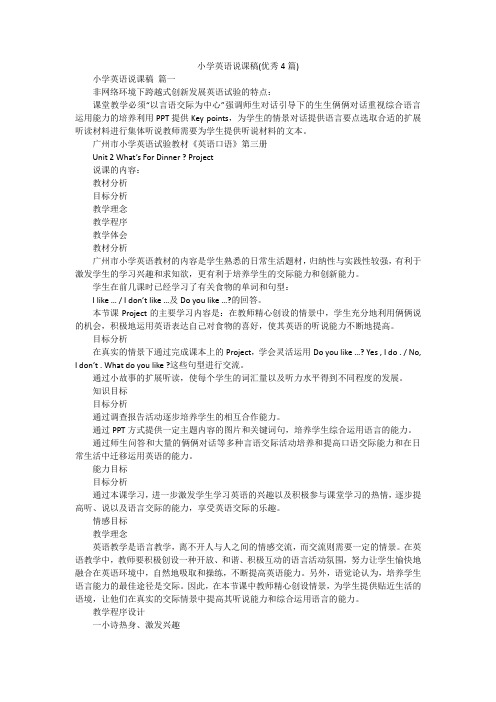
小学英语说课稿(优秀4篇)小学英语说课稿篇一非网络环境下跨越式创新发展英语试验的特点:课堂教学必须“以言语交际为中心”强调师生对话引导下的生生俩俩对话重视综合语言运用能力的培养利用PPT提供Key points,为学生的情景对话提供语言要点选取合适的扩展听读材料进行集体听说教师需要为学生提供听说材料的文本。
广州市小学英语试验教材《英语口语》第三册Unit 2 What’s For Dinner ? Project说课的内容:教材分析目标分析教学理念教学程序教学体会教材分析广州市小学英语教材的内容是学生熟悉的日常生活题材,归纳性与实践性较强,有利于激发学生的学习兴趣和求知欲,更有利于培养学生的交际能力和创新能力。
学生在前几课时已经学习了有关食物的单词和句型:I like … / I don’t like …及Do you like …?的回答。
本节课Project的主要学习内容是:在教师精心创设的情景中,学生充分地利用俩俩说的机会,积极地运用英语表达自己对食物的喜好,使其英语的听说能力不断地提高。
目标分析在真实的情景下通过完成课本上的Project,学会灵活运用Do you like …? Yes , I do . / No, I don’t . What do you like ?这些句型进行交流。
通过小故事的扩展听读,使每个学生的词汇量以及听力水平得到不同程度的发展。
知识目标目标分析通过调查报告活动逐步培养学生的相互合作能力。
通过PPT方式提供一定主题内容的图片和关键词句,培养学生综合运用语言的能力。
通过师生问答和大量的俩俩对话等多种言语交际活动培养和提高口语交际能力和在日常生活中迁移运用英语的能力。
能力目标目标分析通过本课学习,进一步激发学生学习英语的兴趣以及积极参与课堂学习的热情,逐步提高听、说以及语言交际的能力,享受英语交际的乐趣。
情感目标教学理念英语教学是语言教学,离不开人与人之间的情感交流,而交流则需要一定的情景。
小学英语说课稿优秀7篇
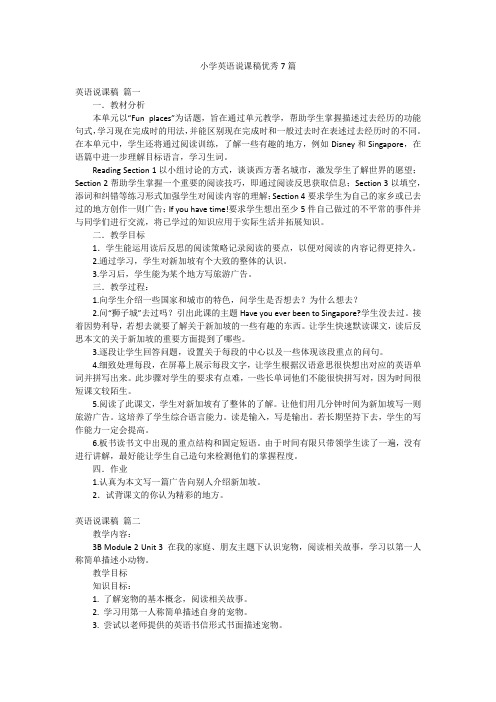
小学英语说课稿优秀7篇英语说课稿篇一一.教材分析本单元以“Fun places”为话题,旨在通过单元教学,帮助学生掌握描述过去经历的功能句式,学习现在完成时的用法,并能区别现在完成时和一般过去时在表述过去经历时的不同。
在本单元中,学生还将通过阅读训练,了解一些有趣的地方,例如Disney和Singapore,在语篇中进一步理解目标语言,学习生词。
Reading Section 1以小组讨论的方式,谈谈西方著名城市,激发学生了解世界的愿望;Section 2帮助学生掌握一个重要的阅读技巧,即通过阅读反思获取信息;Section 3以填空,添词和纠错等练习形式加强学生对阅读内容的理解;Section 4要求学生为自己的家乡或已去过的地方创作一则广告;If you have time!要求学生想出至少5件自己做过的不平常的事件并与同学们进行交流,将已学过的知识应用于实际生活并拓展知识。
二.教学目标1.学生能运用读后反思的阅读策略记录阅读的要点,以便对阅读的内容记得更持久。
2.通过学习,学生对新加坡有个大致的整体的认识。
3.学习后,学生能为某个地方写旅游广告。
三.教学过程:1.向学生介绍一些国家和城市的特色,问学生是否想去?为什么想去?2.问“狮子城”去过吗?引出此课的主题Have you ever been to Singapore?学生没去过。
接着因势利导,若想去就要了解关于新加坡的一些有趣的东西。
让学生快速默读课文,读后反思本文的关于新加坡的重要方面提到了哪些。
3.逐段让学生回答问题,设置关于每段的中心以及一些体现该段重点的问句。
4.细致处理每段,在屏幕上展示每段文字,让学生根据汉语意思很快想出对应的英语单词并拼写出来。
此步骤对学生的要求有点难,一些长单词他们不能很快拼写对,因为时间很短课文较陌生。
5.阅读了此课文,学生对新加坡有了整体的了解。
让他们用几分钟时间为新加坡写一则旅游广告。
这培养了学生综合语言能力。
小学英语说课稿(通用5篇)
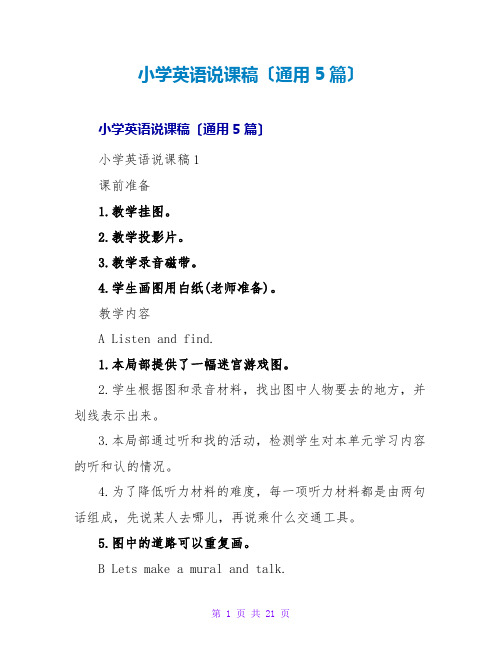
小学英语说课稿〔通用5篇〕小学英语说课稿〔通用5篇〕小学英语说课稿1课前准备1.教学挂图。
2.教学投影片。
3.教学录音磁带。
4.学生画图用白纸(老师准备)。
教学内容A Listen and find.1.本局部提供了一幅迷宫游戏图。
2.学生根据图和录音材料,找出图中人物要去的地方,并划线表示出来。
3.本局部通过听和找的活动,检测学生对本单元学习内容的听和认的情况。
4.为了降低听力材料的难度,每一项听力材料都是由两句话组成,先说某人去哪儿,再说乘什么交通工具。
5.图中的道路可以重复画。
B Lets make a mural and talk.1.本局部是一项学生自主活动。
学生以小组为单位,画一幅街道的图画(mural意为:壁画;天花板的装饰画)。
2.本局部提供了一幅学生画习作,供学生小组活动时参考。
3.学生绘画完毕后,应对本组的作品集体进展描绘,以此来检测自己对本单元学习内容的说的情况。
教学建议1.老师出示本课教学挂图,要求学生用“I can see....”语句对图画进展简单描绘。
2.老师请学生猜一猜画面上人物要去哪儿,引导学生说出在本单元学到的交际用语(注意:说本单元交际用语时需要换人称,老师可以帮助学生说,如:老师说前半句Andy is,学生接后半句going to the supermarket.)。
3.学生听录音并画线。
该练习做完后要有反响,老师要帮助学生核对答案。
核对答案时学生可以互相交换课本,以逐步学会互相检查。
4.老师将学生分成4至5人一组,每组发一张白纸,要求学生以组为单位,画出想象中的街道。
老师也可以给出街道示意图(如下列图),请学生添加画面。
这项练习的另外一个做法是:课前布置任务,学生同样以组为单位,搜集有关街道建筑、设施、车辆的图片,并将图片剪下来带到课堂。
课堂活动时,大家有选择的将自己搜集到的图片贴在一起,组成街道拼贴画。
为防止大家都找同一类型的图片,布置任务时老师可以指导学生进展分工。
小学英语说课稿范文英文版(优选十八篇)

小学英语说课稿范文英文版(优选十八篇)(经典版)编制人:__________________审核人:__________________审批人:__________________编制单位:__________________编制时间:____年____月____日序言下载提示:该文档是本店铺精心编制而成的,希望大家下载后,能够帮助大家解决实际问题。
文档下载后可定制修改,请根据实际需要进行调整和使用,谢谢!并且,本店铺为大家提供各种类型的经典范文,如工作总结、工作计划、合同协议、条据文书、策划方案、句子大全、作文大全、诗词歌赋、教案资料、其他范文等等,想了解不同范文格式和写法,敬请关注!Download tips: This document is carefully compiled by this editor. I hope that after you download it, it can help you solve practical problems. The document can be customized and modified after downloading, please adjust and use it according to actual needs, thank you!Moreover, our store provides various types of classic sample essays for everyone, such as work summaries, work plans, contract agreements, doctrinal documents, planning plans, complete sentences, complete compositions, poems, songs, teaching materials, and other sample essays. If you want to learn about different sample formats and writing methods, please stay tuned!小学英语说课稿范文英文版(优选十八篇) 小学英语说课稿范文英文版(篇一)and congenial, with a strong sense of responsibility and good team-spirit.all the courses in the specialized field, obtaining good command of theoretic knowledge and eXperimental and DIY skill; Very adaptable and Good at leaning.played a couple important roles in the student organizations, honing the interpersonal communication skills and organizational capability.a wide range of hobbies, including oral English, music,movies and literature .in oral English , with fairly good of reading and writing ability; Speaking authentic Mandarin-Chinese.command of Computer skills: .cnfamiliar with different versions of Windows OS and Office application software, able to program with C and Fortran languages,obtained some eXperience and understanding about other widely-used software like Autocad, Photoshop, Coreldraw and Dreamweaver.Strong perception & intellect; with widen and swift thinking; able to be quickly adapted to different environmenet.Diligent; with sureness; responsible; everytime fulfil myduties to my own work.Conscientiously, absorbedly work in a planned and order way; pursue the perfection.Good image; temperate, calm and steady personality; strong affinity; good at getting along with people.Patient; have holding capacity to pressure and setback.英文版简历01-14简历英文版04-30小学英语说课稿范文英文版(篇二)XXX is rich in professional knowledge,with solid foundation and practical ability.He is able to put forward his own views in his field.Hes honest, cheerful, hard-working and pragmatic,bearing a strong adaptability and teamwork capabilities.Hes also a person full of responsibility, sense of justice, and sence of collective, eager to do volunteering work for the public.XXX is able to put the interests of the whole above everything else, willing to suordinate himself to the collective interests, with the spirit of dedication.小学英语说课稿范文英文版(篇三)I am cheerful, and his careful, meticulous work, hard working, down to earth work, there is a strong sense of responsibility, team spirit, but also has a strong abilityto work independently, active thinking.Able to skillfully use Windows Office Word, EXcel, XXX and other applications, according to the needs of XXX, the completion of the work surface XXXX, XXXX have a good sense of communication skills and strong negotiation skills;Professional advice and product and supplier information in XXXX, the proposed feasibility recommendations, follow XXXX solve the problem; have team spirit, a sense of responsibility, good character, correct thinking; have a certain file management capabilities.小学英语说课稿范文英文版(篇四)XXXSeX: maleDate of Birth: July 27,1955Ways of Communications:Mobile phone:E-mail:Education:July 1971 graduated from Middle School of Jilin Province ofSep 1971 entered No.1 Senior Middle School of Jilin Province ofJuly 1974 graduated from Senior Middle School of Jilin Province ofAug 1974 became an "intellectual youth" and began to do farm work in my home village (such was the case for all middle school graduates during the "Cultural Revolution")March1978 entered English Faculty of Foreign Languages Dept.of Northeast Normal University of through the first college entrance eXam after the "Cultural Revolution"Working EXperience:Feb 1982 became a teacher in English Teaching Office of Foreign Languages Dept.of Harbin University of Science and Technology of China; at the same time, working as a part-time translator in Language Translation Center of Heilongjiang Province and many other translation companies, with millions of characters of translation works covering many fields in such languages as English,French,German,Japanese, Chinese,Spanish,Italian,Russian, Arabic,Latin,etc.published both home and abroad.May 1998 went to Tokyo, Japan, and began to work as a Chinese lecturer at Japanese- Chinese College of Tokyo and some small-scaled Chinese classes in the society.Sometimes, did some translation jobs at home.Sep 2000 returned to China and started teaching English at Tsinghua University of Beijing and doing part-time translation jobs for various companies.Degrees and Qualifications:BA of Northeastern Normal University of ChinaMay1992 TOEFL, score: 630 (composition score: )June1994 English Associate Professor of Harbin University of Science and Technology of China小学英语说课稿范文英文版(篇五)The work of the positive and serious attitude, strong sense of responsibility, is sincere, careful, optimistic, athletic,a good team player,able to quickly adapt to the work environment, and to continue to learn in practical work and constantly improve themselves and do their own work .I am a positive, optimistic, pragmatic, continuous learning,struggling to forge ahead of the people.Do not want to fall behind, I do not want to fall behind; behind, losing all chance of success.Learning is also essential,no knowledge is difficult to succeed; at the same time, to fight for their practice more opportunities to succeed!小学英语说课稿范文英文版(篇六)I am responsible for the work,there is a positiveprofessionalism, able to communicate with the leadership and coordination, and his affinity sincere harmoniously and be able to communicate with employees to improve the quality of the best employees, the factory can pay a personal price for the interests of the company create higher performance, hope your company can give me a chance to develop, but this time you regret your choice.小学英语说课稿范文英文版(篇七)Good morning,ladies and gentlemen.I am Leo from Guangzhou ZhengXin International School.I am a sunny boy.My family love me and I love them too.My mom works very hard every day.She comes home very late in the evening.Do you know how to help the parents at home? Let me tell you about that.Usually my dad cooks for us.Sometimes I help my dad to wash the vegetables.Sometimes I set the table.I always wash the dishes when we finish eating.After I finish my homework I often water the flowers.I also look after my pet fish.I feed the fish before I go to bed.I really enjoy helping my parents at home.Do you think I am a helpful boy? I think so! Thank you!小学英语说课稿范文英文版(篇八)XXXFemale, 26,Education: bachelor degreeWorking years: 5-8 yearsEXpected salary: negotiableWorking location: guangzhou - there is no limitObjective: early childhood teachers ta teaching/educational administration personnel | manager assistant/secretary/clerkWork eXperience (work for seven years and siX months, made 2 job)Dongguan city changan kindergartenWorking time: since July 20XX [3 years and 6 months]Job title: eXecutiveJob content: responsible for the kindergarten garden wang,logistics affairs and archives, kindergarten platform system work well.Dongguan humen kindergartenWorking time: July 20XX to July 20XXJob title: garden helpEducation eXperienceGraduated in December 20XX South China normal university education managementDongguan institute of technology,human resources management in school todayGraduated in July 20XX Jiangmen infant normal school Preschool educationProfessional skillsWord: proficient in eXperience: 5 yearsEXcel: skilled eXperience: 5 yearsCertificate of awardCertificate name: national computer level 1 certificate issued by time: in September 20XXThe name of the certificate: teacher certificate issued by time: in December 20XXThe name of the certificate: preschool teacher certificate issued by time: in October 20XXThe name of the certificate: mandarin level 2 grade a Issued by time: in May 20XXQualification certificate of title: director of training certificates of time: in November 20XX小学英语说课稿范文英文版(篇九)Hello, everyone! My name is _ and my English name is _.I’m 12 years old.I’m a student in a very beautiful school called Liangbing Middle School and I am in Class 1 Grade 5.My hometownLiangbing is also a beautiful town.I’m very happy and I like to make friends with others.I also like singing but traveling is my favorite, I have been to many interesting places in China but I haven’t been to other countries.What a pity!At school, I study Chinese,math, English, history,politics and so on.I like all of them.I often help my teacher take care of my class and I think I am a good helper.I live with my parents and we go home on time every day.When I am at home, I often help my mother do some housework and my mother said I am a good helper, too.My mother is a cuts hair very is people like her.she often teaches me the way of learning well, if you want to learn English well, here is some of my advice.At first , you must read many articles and know many words, if you meet up with some new words, you can look them up in the dictionary, you should know their meanings,how to read them and spell them.If you keep working hard, you will be successful.Then, you ought to speak English as much as possible.Remember an old saying, Nothing is impossible in the world if you put your heart into it.That’s all, thank you.小学英语说课稿范文英文版(篇十)I am fine style, others with sincerity, good personalrelations, doing things calm and steady, reasonable overall arrangement can live in the transaction.Have strong logical way of thinking about things serious and responsible, able to endure hardship involved, have a strong sense of responsibility and team spirit; confident,optimistic, with a certain sense of innovation.小学英语说课稿范文英文版(篇十一)highly motivated, creative and versatile real estate eXecutive with seven years of eXperience in property acquisition, development and construction, as well as the management of large apartment compleXes.especially skilled at building effective, productive working relationships with clients and staff.eXcellent management,negotiation and public relations skills.seeking a challenging management position in the real estate field that offers eXtensive contact with the public.小学英语说课稿范文英文版(篇十二)After many years of intense studying and life,I have a good capability to endure the pressure from life and a calm mind,meanwhile I have better logic thinking and judgement ;I am honest to others,optimistic to life,and calm;I have better group cooperation spirit and some consciousness of creation;Iadmire those people who will change his words into like this,I have come through those days,I stick to my belief,try my best to be a practical man and do my work effectively.小学英语说课稿范文英文版(篇十三)Name:Nationality: China (Mainland)Current Place: Guangzhou Height/Weight: 25 yearsMarital Status:Preferred job title: JobseekerForeign language: Manager 、Foreign trade/trade manager/supervisor: manager or director 、Vocational education/training/family education: TeacherWorking life: 3Title: No titleJob type: EXpected Start date: In a dayEXpected salary:Preferred working place: Guangzhou Shenzhen ZhuhaiWork EXperience :Companys name: Singapore A2M Imp.& EXp.and end date: 20XX-12-20XX-10Enterprise nature: Soly foreign funded enterprisesIndustry: Electrical/electronics/communication equipmentJob Title: International Trade ManagerJob description:(1)EXploring overseas market, purchasing materials & selling finished products(2)Establishing good business relationship with foreign customers by E-Business, fairs and other channels (3)Making shipping documents(4)Following the logistics issues小学英语说课稿范文英文版(篇十四)Hello, everyone, its my honor to stand here introducing myself.My name is _X, from Class 2, Grade siX,__ Primary School.Im doing well in my study, besides Im the monitor of my class and I get on well with my classmates.Im a happy and talented girl.Im good at drawing and many of my drawings have won prizes.At the same time, I like telling stories.Im interested in learning English very much, and I believe that I will do well in future.I wont let you down!Thanks for your listening.小学英语说课稿范文英文版(篇十五)My name is Li Haiqing.I am a local person who is 11yearsold.I am from chongqing and I am of the opinion that my hometown is a beautiful city.Moreover, I would like to say something about my family.I have my mother ,my father,and my elder sisther,they love me very much,I know my parents have so much hops and dreams for me。
小学英语说课稿(6篇)
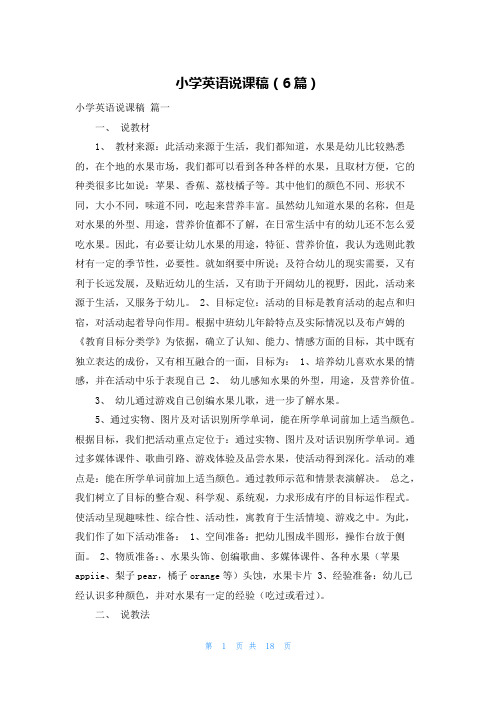
小学英语说课稿(6篇)小学英语说课稿篇一一、说教材1、教材来源:此活动来源于生活,我们都知道,水果是幼儿比较熟悉的,在个地的水果市场,我们都可以看到各种各样的水果,且取材方便,它的种类很多比如说:苹果、香蕉、荔枝橘子等。
其中他们的颜色不同、形状不同,大小不同,味道不同,吃起来营养丰富。
虽然幼儿知道水果的名称,但是对水果的外型、用途,营养价值都不了解,在日常生活中有的幼儿还不怎么爱吃水果。
因此,有必要让幼儿水果的用途,特征、营养价值,我认为选则此教材有一定的季节性,必要性。
就如纲要中所说;及符合幼儿的现实需要,又有利于长远发展,及贴近幼儿的生活,又有助于开阔幼儿的视野,因此,活动来源于生活,又服务于幼儿。
2、目标定位:活动的目标是教育活动的起点和归宿,对活动起着导向作用。
根据中班幼儿年龄特点及实际情况以及布卢姆的《教育目标分类学》为依据,确立了认知、能力、情感方面的目标,其中既有独立表达的成份,又有相互融合的一面,目标为: 1、培养幼儿喜欢水果的情感,并在活动中乐于表现自己 2、幼儿感知水果的外型,用途,及营养价值。
3、幼儿通过游戏自己创编水果儿歌,进一步了解水果。
5、通过实物、图片及对话识别所学单词,能在所学单词前加上适当颜色。
根据目标,我们把活动重点定位于:通过实物、图片及对话识别所学单词。
通过多媒体课件、歌曲引路、游戏体验及品尝水果,使活动得到深化。
活动的难点是:能在所学单词前加上适当颜色。
通过教师示范和情景表演解决。
总之,我们树立了目标的整合观、科学观、系统观,力求形成有序的目标运作程式。
使活动呈现趣味性、综合性、活动性,寓教育于生活情境、游戏之中。
为此,我们作了如下活动准备: 1、空间准备:把幼儿围成半圆形,操作台放于侧面。
2、物质准备:、水果头饰、创编歌曲、多媒体课件、各种水果(苹果appiie、梨子pear,橘子orange等)头蚀,水果卡片 3、经验准备:幼儿已经认识多种颜色,并对水果有一定的经验(吃过或看过)。
小学英语全英说课稿(10篇)精选

小学英语全英说课稿(10篇)温馨提示:本文是笔者精心整理编制而成,有很强的的实用性和参考性,下载完成后可以直接编辑,并根据自己的需求进行修改套用。
小学英语全英说课稿第1篇:Part One Analysis of the Teaching Material(一) STATUS AND FUNCTION1。
This is an important lesson in Book One。
From this lesson, it starts asking the Ss to grasp contents of each Sample。
To attain four skills request of listening, speaking, reading and writing。
To start listing Word Bank and tell the Ss to remember the new words。
To start asking the Ss to write the English sentences well。
Therefore this lesson is in the important position of the teaching material。
2。
This lesson is the first one of Unit 2。
So if the Ss can learn it well, it will be helpful to make the Ss learn the rest of this unit。
3。
Such a topic is related to daily life, so it is helpful to raise learning interests of students and it will be also helpful to improve their spoken English。
小学英语说课稿(优秀3篇)

小学英语说课稿(优秀3篇)小学英语说课稿篇一一、教材分析本次说课我所使用的教材是义务教育课程标准实验教科书,小学三年级上册第四单元We Love Animals。
本套教材非常注重学生语言应用能力的培养,从学生的角度来讲,基础教育最主要的任务是要学会学习,开发自主学习能力,培养创新能力。
本教材在整体构思、内容安排、活动设计和教学方法都采用了与学生紧密联系的生活实际,真正体现了语言的交际功能,同时,它把知识和技能目标融会在了完成任务的过程之中,从而体现出了英语新课标提出的把话题---功能---结构---任务结合起来的总思路,为培养学生运用英语进行交流打下良好的基础。
1、本课教学内容(1) Lets learn本部分主要是学习常见动物单词cat dog monkey duck panda rabbit(2)Lets talk学习句型I have a …以及Super! Cool! Wow! Great!等表示赞美的感叹词语。
(3)Lets do.本部分要求学生在“Act like a”的指令下模仿小动物的动作。
2、本课教学目标:(知识目标、能力目标、德育目标)知识目标(1)能听懂,会说Look! I have a … 并能在实际情景中运用。
(2)能听说,认读一些常见的动物单词。
(3)能听懂,会说几个常用的感叹词Super!Cool!Wow!Great!并能够在实际情景中运用。
(4)能听懂简单的指示语,并能按照指令模仿动物做出相应的动作。
能力目标:提高学生听、说、读、写的综合能力。
德育目标:教育学生要爱护和保护小动物。
3、重难点的确定重点:能听说认读常见的动物单词,并能运用句型“Look! I have a ”难点:由于学生年纪小,对于一节课要正确运用所学句型和四种表达感叹的词,有一定的难度,而且特别容易混淆。
通过本课的学习,运用自然引入的方法帮助学生正确理解与使用重点句型和四个感叹词。
二、教材处理1、以“旧”引“新”依据知识迁移规律的新旧知识的内在联系,从已学过的知识引出要学的知识,从课前的日常对话引入单词教学。
小学英语说课稿(通用20篇)

小学英语说课稿小学英语说课稿(通用20篇)作为一名无私奉献的老师,往往需要进行说课稿编写工作,借助说课稿可以提高教学质量,取得良好的教学效果。
那么说课稿应该怎么写才合适呢?下面是小编为大家收集的小学英语说课稿,仅供参考,欢迎大家阅读。
小学英语说课稿篇1一、说教材(一)分析本课内容在教材中的地位和作用。
本课内容是全书第二模块的第二单元,属于我任课第二模块的第三课时,第一单元耗时两个课时,今天要讲述的第二单元为本模块的第三课时。
课文内容是第一单元买电脑的内容延伸,主要讲述千和百大数字的英语及数字表达方法。
本单元分为四个部分,第一部分为一段大明选择钢笔的描述,第二部分是听录音,选择正确的图片,意在培养孩子的听力,第三部分是一首关于卖电脑的诗歌,最后一个部分是一个游戏,还是练习在第一单元中出现的几个形容词,加深孩子的印象。
(二)本节课的教学目标1.知识目标:花费多少钱的英语表示方法及读法的掌握。
2.能力目标:能够说出自己所买物品的价格。
3.情感目标:培养学生合理理财的观念。
(三)教学重难点本课的教学重点就是数字的英语表示方法,应当在课堂中不断操练,确保每一个孩子都能够正确说出几千几百数字的表示方法;本课的教学难点是课文正文的熟练朗读和诗歌的熟练朗读,需要教师巧用方法,激发学生的记忆。
二、说教法为了顺利完成以上的教学目标,更好地突出重点,突破难点,按照学生的认识规律,我采用讲读、直观演示、交际、愉快教学相结合的方法;在课堂教学中,我将结合愉快教学,激发学生学习英语的兴趣。
教学不是简单的知识传授,为了不使学习感到枯燥无味,我采用多种教学手段,如多媒体电化教学,比较形象、直观,在教学过程中启发、引导学生思维,培养不同层次的学生大胆用英语交际的能力三、说学法根据本课句型特点及学生现有的知识水平,我准备引导学生采用听、看、读、想、说的方法来学习本课,通过听、看,达到有所思,有所得,能说出问题的关键,帮助学生掌握学习重点,多表扬,勤鼓励,便不同层次的学生都有学习教育积极性,在知识上均有所提高。
- 1、下载文档前请自行甄别文档内容的完整性,平台不提供额外的编辑、内容补充、找答案等附加服务。
- 2、"仅部分预览"的文档,不可在线预览部分如存在完整性等问题,可反馈申请退款(可完整预览的文档不适用该条件!)。
- 3、如文档侵犯您的权益,请联系客服反馈,我们会尽快为您处理(人工客服工作时间:9:00-18:30)。
小学英语优秀说课稿小学英语说课稿Lesson 45PART 1 Analysis of the Teaching Material(I)STATUS AND FUNCTION1.This unit is a revision unit, so it covers all communicative language knowledge learned from Unit 7 to Unit 11.2.This lesson is the first one of Unit 12. So if the students can learn this lesson well, it will be helpful to make the students learn the rest of this unit.3.This lesson is a dialogue about keeping fish. Such topic is related to daily life, so it is helpful to raise learning interests of students and it will be also helpful to improve their spoken English.(II)TEACHING AIMS AND DEMANDSKnowledge objects1. To make the Ss know how to keep fish, birds or any other animal by learning the dialogue of this lesson.2. To give a reinforced practice in the use of the Modal Verbs and some useful expressions for making suggestions.Ability objects3. To improve students’listening and speaking ability by reading and practising the dialogue.4. To develop students’ communicative ability by learning the useful expressions for making suggestions and replying.Moral objects5. To enable the students to love life and animals, protect the nature and environment.(III)TEACHING KEY POINTS:1.To make the Ss grasp and understand the way of making suggestions and reply in daily life.2.To enable the students to use useful expressions for making suggestion and replying in their own dialogues related to the daily life.(IV)TEACHING DIFFICULTIES:1. The usage of the Modal Verbs ,especially usage for making suggestions.2. Using the learned phrases and sentence patterns to make suggestions and replying.(V)TEACHING AIDS:Multi-media computer; OHP(overhead projector); tape recorder; software: Powerpoint or AuthorwarePART 2 Teaching Methods1>Five Steps Approach.2>Communicative Approach.PART 3 Studying Ways1. Teach the students how to be successful language learners.2. Teach the students how to master dialogues and how to communicate with others.PART 4 Teaching ProcedureStep 1 RevisionGet the students to give some animals’ names they know by asking the students the following question: Can you give us some names of different animals you know? This step is employed to revise the words related the animals. At the same time draw the students’ attention to the topic about animals.Step 2 Lead-inSign to the students to be quiet and close their books. Then start a free talk with the students. Use computer to show some pictures of different pets, such as dogs, cats etc. Ask the students several questions about raising pets. These questions are employed to warm up the students and raise the interests of the students to speak English in class on the topics they like and familiar with.Good morning, everyone!Toda y, I’ll say something about Unit 9 Part A in Book 4 of Oxford English.Background on the reformation of curriculum, this book can connect the life and act, emphasize the interest and experience of the Ss, the pictures are active and vivid. Grade four is the initial stage of English learning, so it stresses on the emotion of the Ss, creates a well beginning for the Ss. This Unit has 7 parts, we’ll learn Part A mainly, it embodies the repeating characterize. Review the learned language points “Where’s…”and t he new language points will be represented in the following units. So this unit forms connecting links with a special meaning in this book.The content of this period is to use “Where’s\are…” to determine the place. And according to the contents and the fact of the Ss, I establish the following three teaching aims of this period:The first one: students can listen, read, say and spell the following words: a glass, a fridge, an egg, bread and a table.The second one: students can listen, read, say and write the following daily expressions: What’s for breakfast?Have some juice then.The third one: students can listen, read, say and write the following sentence patterns: Where’s\Where are the\my…It’s \They’re…There’s no …in \on \near…I think the most difficult point of this period is to make sure the students can use the patterns “Where’s\Where are…and There is no …in\on\near…” in their daily life correctly. And I will use some pictures, words and sentence cards, a tape recorder and themulti-media computer to help me achieve the aims.The task-based method, communicated method, group cooperate method will be used in this period.To accomplish the aims, I design the following steps:Step 1 Songs and the game arousers the emotion.In order to attr act the Ss’ attention and construct an atmosphere of learning English, I let the students sing some English songs and play the game “Simon says”. At the same time the game can review the prep, serve the knowledge as foil and consist the appearance of the knowledge.Step 2 Change class to life, happy to say.The substance of language is communication and the environment of communication is life. So when I present the sentence pattern “What’s for breakfast?” I first show a clock to elicit the time for breakfast, teach the sentence. Then show my own photo of having breakfast, Ss ask and guess. In this way I can attract Ss’ attention, encourage Ss to ask Qs with the new knowledge.Most of the Ss have learnt the sentence pattern: Where’s…? so I design a task f or Ss to help Helen find the food and drinks for breakfast, and teach the new language points: Where are…? They’re … Meanwhile stick the sentences on the Bb.After some practice by asking and answering, I present the next language points: There’s no …in\on\near…Have …then.And I will stick these sentence patterns on the Bb. Finally I’ll let the Ss do pair works to consolidate them.Step 3 Listen to the tape and Ss imitate to read and say.As the new reformation of curriculum, emphasized the traditional class attach importance to the mechanical teaching, neglect the experience and participation, for example, thefive-step method. So in this lesson, after presentation, I ask Ss to listen to the tape with three Qs, read in different roles and in pairs, then try to recite the text.Step 4 Ss be the main body, T makes a guider.In class, Ss play as a host, and the T makes an influence on guiding, help Ss to act the learnt dialogue, it can stress the position of the Ss, and arouse their interest.Then I show a carton with no voice, ask Ss to make a dialogue in pairs.There are lots of ways to consolidate the new knowledge. Playing game is a good way. So according to the physiology of Ss, I hold a group competition during the game, ask Ss to finish the bla nks. In this way can develop Ss’ good habits and achieve the aim of mastering the learned knowledge in situation.Step 5 Change class to life, learn by themselves.Is this the end of the class? I don’t think so. If there is an end, I think it should be i n the life. So I extend this class, encourage Ss to use the learned to communicate with each other in their life.In a word, the whole period is based on tasks, which are designed from easy steps to steps that are challenging. When the Ss are carting out the tasks, they can acquire information, knowledge, and have their ability and skills trained.That’s all. Thanks a lot for your attention.先说Class begins,good morning/afternoon boys and girls.再说Do you know xxx?It's xxx(adj).Open your book and turn to page xxx,today we'll learn something about it/them.Thank you!。
